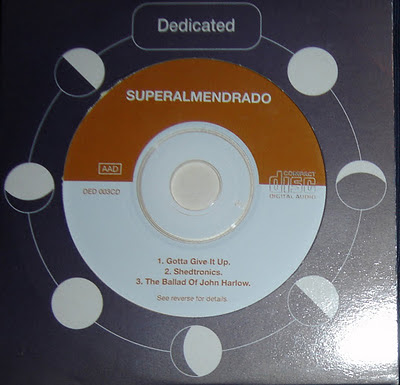Label: Stuf Records
Year of Release: 1991
I was, and remain, completely unaware of what it was that actually drove Southend band Foreheads in a Fishtank through the early nineties. Despite managing to get themselves signed to Some Bizarre shortly after this single was issued, there can be fewer bands in the UK who were greeted with more confusion or bewilderment at the time.
Formed in the late eighties as a slightly rockist band (who one local man insists sounded rather like early Genesis) they gradually turned their attention to skewed, wobbly bass riffs, industrial rhythms, and perverse sloganeering. "I Want To Masturbate at Castle Donnington" is probably one of the better examples of their work, combining looped eastern wailing with threatening vocals, which are then frequently punctuated by "Psycho" referencing instrumental effects. It's actually not at all funny, despite the title, and sounds more like the work of obsessive stalkers who would give Barry George a run for his money. If somebody followed you down the street playing this on a ghetto blaster whilst singing "Give me pleasure" along with it, you'd run as hard as you could.
The B-side "Happy Shopper" was the A-side of their previous single, which was withdrawn after the cut-price food chain objected to its content. A prolonged, jerky rant against domestic bliss, the singer Jeff regularly screams "Who bought these tea bags?" in fury, whilst the verses are punctuated with the line "She grabs a plastic fish fork and she buggers me". There's a certain Stump-iness to the rhythm section on this track, but both sides remind me much, much more of Australian pranksters TISM. FIAFT could easily have been their Home Counties brothers.
Their debut album "Buttocks" was a very samey affair, but not unworthy - John Peel loved it, and offered them two sessions, and it certainly had its fans elsewhere too. For the most part, though, nobody knew quite how to deal with the band. They were mentioned in the same breath as The Swell Maps and Stump in reviews, but their crudeness combined with art-school song structures alienated the frat-boy audience just as much as it did the intelligent fringe crowd. Fans of both bands were not known for their love of vulgarity.
It's probably also worth mentioning as a footnote that the band had some peculiar and unorthodox ways of getting press attention without hiring a Press Officer or even being signed to a label. They once got into Kings Reach Towers and plastered their posters all over the walls of the NME's toilets - one review the magazine subsequently published largely consisted of a request asking them to come back and clean up. They also sent out packets of lard to music critics (which melted all over their records, causing a lot of anger and resentment), and on one occasion publicised a bunch of gigs in the NME's gig guide in places that didn't even exist (which were published completely unchecked). It may have got them press, but one has to wonder how much long-term ill feeling it all generated. One thing's for sure, though, they livened up Southend at a point in time where there really wasn't a hell of a lot going on there... I certainly enjoyed having my own set of renegades-about-town for a while.
(This entry was originally uploaded in August 2008, and somewhat unexpectedly got an enthusiastic response from many readers. Rather more worryingly, one of the band got in touch to correct me on the Genesis critique a friend of mine (who actually drummed in a band with me) originally raised with these pointed words: "Let me make this clear. Foreheads in a Fishtank were an anti establishment band ten years before the invention of the Internet. They had nothing to do with ‘Genesis’ though they may have agreed with ‘keep those mowing blades sharp’
In the late eighties some bands experimented with deconstruction of ‘melody’ into noise. Site: ‘My Bloody Valentine’. Which is why we hated soft bellied ‘NME’. Foreheads were clearly a part of the ‘Melody Maker scene’.
We sort to connect those sounds with down to earth lyrics. Those of day-to-day pointlessness and banality.
We looked to create three to four minute pop songs de-constructed from Melody into ‘NOISE’.
So we had more in common with ABBA than Genesis.
We hated all forms commerciality. And had the last laugh at the commercial record industry by finally understanding the inevitable pointless destruction of everything and the universe.
Everything is fleeting and passing. We choose to make a large wall of sound before our own inevitable death."
Glad we've finally managed to clear that one up, then.)
(FIAFT's material is shortly to be remastered and reissued, and the band have requested that any downloads should be removed from this site.)































